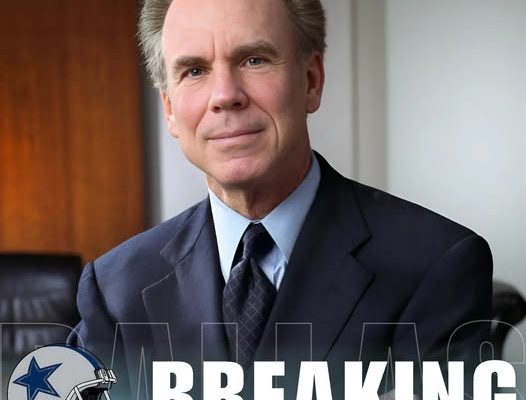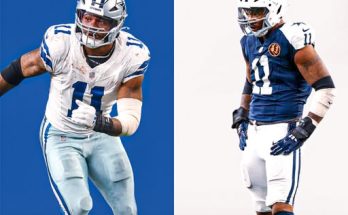Roger Staubach’s name resonates deeply within the history of the NFL and particularly with the Dallas Cowboys franchise. Known as “Captain America,” Staubach was more than just a great quarterback; he was a cultural icon, a symbol of leadership, perseverance, and excellence that transcended the gridiron. As news spreads of his farewell, it invites a heartfelt reflection on his extraordinary career, his impact on football, and the lasting legacy he leaves behind for fans and players alike.
Born in Cincinnati, Ohio, in 1942, Roger Thomas Staubach’s journey to football greatness began long before his NFL days. He was a multi-sport athlete in high school, excelling in baseball and football. But it was his collegiate career at the United States Naval Academy that truly set the stage for his future accomplishments. Playing for Navy, Staubach led the Midshipmen to a remarkable 9-1 record in his senior year, capturing the attention of football enthusiasts nationwide. His athleticism, intelligence, and poise were apparent, as was his capacity to handle pressure, attributes that would later define his professional career.
Staubach’s football path took an unusual turn compared to many of his contemporaries. After being drafted by the Dallas Cowboys in the 1964 NFL Draft, he didn’t immediately join the league. Instead, true to his commitment as a naval officer, Staubach served his country for four years, including a tour in Vietnam. This period of military service not only showcased his character but also ingrained a deep sense of discipline and resilience that would become hallmarks of his approach to football and life.
When Staubach finally joined the Dallas Cowboys in 1969, the team was on the cusp of transformation. The Cowboys had experienced some success, but the arrival of “Roger the Dodger” — a nickname earned for his uncanny ability to evade defenders — marked a new era. His style was revolutionary for his time: he combined mobility with a sharp football intellect, reading defenses with surgical precision and improvising when plays broke down. Staubach was not just a passer but a playmaker who could create opportunities out of chaos.
Under his leadership, the Dallas Cowboys ascended to become “America’s Team,” a moniker that reflected both their on-field success and widespread popularity. Staubach’s charisma, work ethic, and clutch performances endeared him to fans nationwide. He was the heartbeat of a team that reached five Super Bowls during his tenure, winning two of them — Super Bowl VI in 1972 and Super Bowl XII in 1978. These victories cemented his status as a champion and a legend in the annals of football history.
Staubach’s career statistics reflect his excellence: over 22,000 passing yards, 153 touchdowns, and a passer rating that consistently ranked among the league’s best. But numbers alone don’t capture the full measure of his impact. Staubach was a consummate leader, known for elevating the performance of those around him. His teammates often spoke of his calm under pressure, his unwavering confidence, and the way he inspired trust. In an era before quarterback-centric offenses became the norm, Staubach helped redefine the position, proving that quarterbacks could be both strategic thinkers and athletic threats.
Beyond the field, Staubach’s influence extended into the broader culture of football and American sports. He was one of the first athletes to leverage his celebrity into successful business ventures, pioneering a model for post-career success that many athletes now emulate. His integrity and humility made him a role model, not just to aspiring players but to anyone striving for excellence in their profession. He became a spokesman for values such as dedication, teamwork, and perseverance.
Roger Staubach’s farewell is more than the closing chapter of a celebrated career; it’s a moment to honor a figure who helped shape the identity of professional football. His style of play inspired generations of quarterbacks who followed, including stars like Troy Aikman and Tony Romo, who would carry the Cowboys’ legacy forward. His influence is evident in the way the quarterback position evolved, embracing mobility and adaptability alongside precision passing.
Moreover, Staubach’s story is a testament to balancing duty, sport, and life with grace. Serving in the Navy before embarking on his NFL career adds a layer of respect and admiration that few athletes can claim. It reminds fans and players alike that greatness is often forged in adversity and commitment to a cause greater than oneself.
As the Dallas Cowboys and the entire NFL community bid farewell to Roger Staubach, it’s clear that his legacy will endure far beyond his playing days. He represents an era when football was beginning its rise to becoming America’s premier sport and helped establish traditions and standards that persist today. His jersey number 12 remains retired by the Cowboys, a symbol of the reverence held for him within the franchise.
Staubach’s farewell also prompts reflection on what it means to be an icon. In sports, icons transcend statistics and highlight reels; they embody ideals, inspire passion, and unite communities. Roger Staubach exemplifies all these qualities. His journey from Navy officer to NFL superstar, from overlooked draft pick to Hall of Famer, is a story of determination, sacrifice, and triumph that resonates deeply.
In the wake of his farewell, fans remember moments like his famous last-minute touchdown pass against the Minnesota Vikings in the 1975 playoffs — a play immortalized as “The Hail Mary.” This iconic throw not only defined his clutch ability but also enriched the mythology of football itself. Such moments are the threads that weave a player into the fabric of sports history.
While the game has evolved significantly since Staubach’s era, his influence remains a guiding force. Current players study his approach, coaches reference his leadership, and fans cherish the memories he created. His impact goes beyond the Cowboys or even the NFL; it touches on the very essence of what competitive sport represents.
Ultimately, Roger Staubach’s farewell is a celebration of a life lived at the highest level of sport and character. It honors a man who gave his best to his team, his country, and his fans. His legacy is one of excellence, leadership, and integrity — values that will continue to inspire for generations to come. The NFL and Dallas Cowboys community may be saying goodbye to the player, but the legend of Roger Staubach will never fade.



